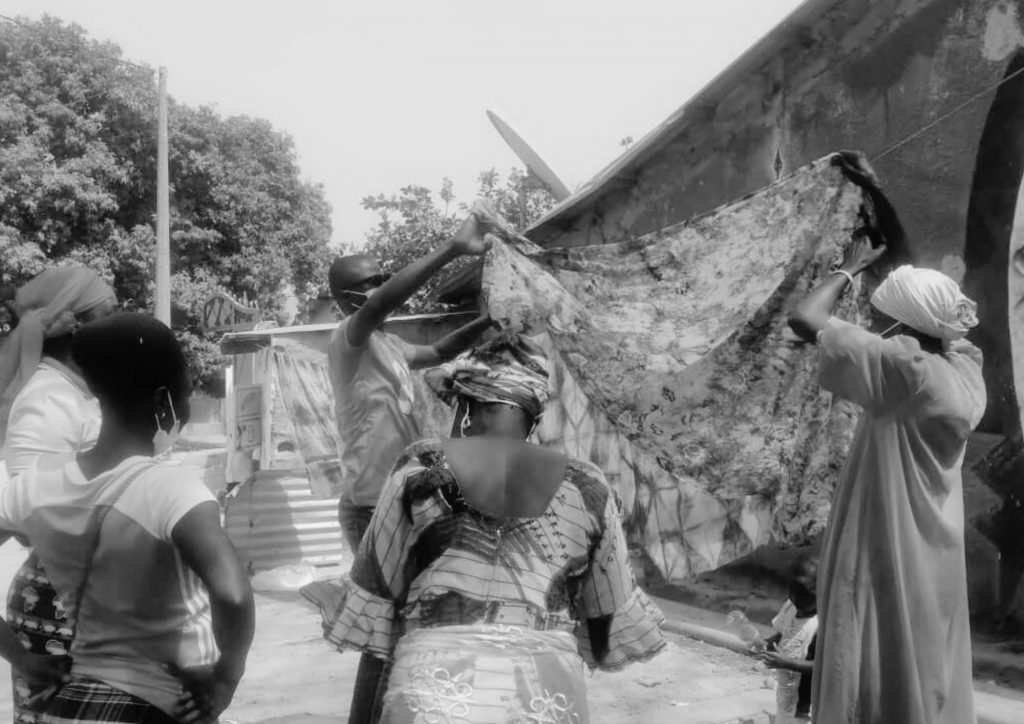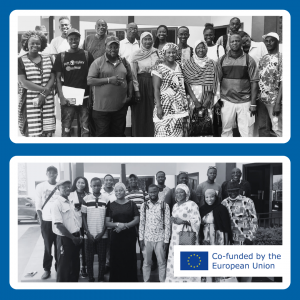Tag Archives: Train the Trainers
Community-Based Heritage Skills Training in Galloya: A Case Study in Women’s Empowerment through Traditional Textile Arts
At HERITΛGE we are happy to see our work create a lasting impact. We are particularly pleased to share a new initiative in The Gambia, the Galloya Street Art Tie & Dye and Batik Training for Women’s Empowerment, organised by Malick Kujabi. Malick is our focal representative in The Gambia and a HERITΛGE trainee himself. He has completed the Training of Trainers (ToT) programme, that HERITΛGE delivered to 30 individuals in the framework of HerMaP Gambia, an initiative to up-skill the country’s heritage, tourism, and sports sectors, co-funded by the European Union.
Malick’s recent training initiative is an inspiring example of how traditional craft skills can be mobilized to promote both cultural continuity and socio-economic development.
Project Overview
Implemented over a three-week period in the village of Galloya, close to the capital Banjul, the training focused on equipping 10 women with practical skills in Tie & Dye and Batik—textile techniques deeply rooted in West African visual culture. The workshop was structured around both technical instruction and applied learning, progressing from basic fabric preparation and design to advanced dyeing techniques, product finishing, and business development.
The training culminated in a community exhibition that not only served to showcase the participants’ work but also reinforced the social value of the craft within the broader community.
The initiative aimed to preserve and transmit traditional textile techniques, foster women’s economic empowerment through skills development, encourage entrepreneurship at the community level, and promote wider community engagement through participatory arts practices.
The training approach combined hands-on instruction with peer learning and included sessions on product design, branding, and marketing strategies. This integration of heritage practices with entrepreneurial training reflects a growing recognition of the role of cultural heritage in sustainable development frameworks.
Sustainability was at the core of the project design. Beyond the immediate training, participants will receive ongoing mentorship aimed at supporting micro-enterprise development. Plans are also underway to facilitate the formation of a cooperative to provide long-term support, market access, and collective visibility for the women’s products.
“This case highlights the potential of grassroots training initiatives to link cultural heritage preservation with social and economic development,” said Denise Navarro, HERITΛGE project manager for The Gambia. “The Galloya workshop demonstrates how ToT programmes can enable participants not only to internalise heritage practices but also to adapt and transmit them in ways that meet present-day needs.”
Training the Trainers in The Gambia
HERITΛGE is very proud to have trained two groups of heritage practitioners during its Train the Trainers workshop in The Gambia in June, in partnership with the Institute of Travel and Tourism of The Gambia. The 29 practitioners completed the first phase of their training and are now ready to go ahead and train a new generation of heritage managers in The Gambia.
“The Train the Trainers workshop is of great value as it promotes ownership among local people by creating an enabling environment that empowers them to design and deliver courses in heritage management, while at the same time encouraging community participation and ensuring the sustainability and significance of their contributions.,” said Mina Morou, Africa Programs Manager for HERITΛGE.
The Train the Trainers workshop is a transformative program that empowers participants to become influential multipliers in the field of heritage management. It provides participants with the essential skills and knowledge to design and deliver effective courses for adult learners in this domain.
The workshop covers various critical aspects including course design principles, assessing student needs, tailoring instruction, building trust with learners, providing feedback, and implementing continuous evaluation processes. It promotes a culture of critical thinking and highlights the significance of understanding cultural nuances in training delivery. Practical exercises and real-world examples are incorporated to facilitate meaningful learning experiences for the participants.
By the end of the workshop, participants are equipped to disseminate the acquired knowledge and make a positive impact in the field of heritage management.
During the training, HERITΛGE was happy to host the Honorable Omar Jatto Jammeh as a guest speaker. The workshop is part of HERITΛGE’s HerMaP Gambia program.
About HerMaP Gambia: The program is aimed at developing the business skills of heritage and cultural managers to enable them to establish and better support heritage and cultural enterprises. Supporting The Gambia’s heritage sector will promote community solidarity and provide high-quality employment opportunities for local talent.
The program is co-funded by the European Union.![]()


